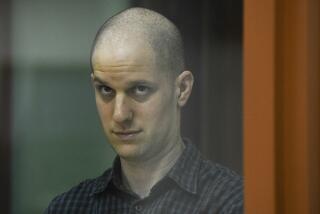Suspect in E-Book Case Free on Bail
- Share via
SAN JOSE — Russian computer programmer Dmitry Sklyarov, whose arrest on charges of breaking a controversial new U.S. copyright law has stirred international attention, was freed on bail Monday.
In a deal worked out between Sklyarov’s lawyers and government prosecutors and approved by a federal judge, the 26-year-old graduate student posted a $50,000 bond and was released into the custody of a Russian American software engineer. The custodian is responsible for making sure Sklyarov, whose wife and children are in Moscow, doesn’t flee.
“This is an important first step . . . but it’s only a first step,” Sklyarov’s lawyer, Joseph Burton, told reporters. Before and after the brief hearing, about 40 pro-Sklyarov demonstrators held such signs as “First Amendment: Void Where Prohibited.”
Three weeks ago, Sklyarov was arrested for developing a way to break the encryption used by publishers to protect electronic books from being copied. The case is one of the first under the Digital Millennium Copyright Act of 1998, which makes it illegal to circumvent software that protects copyrighted material.
Sklyarov works for a Russian company called ElcomSoft, which specializes in password recovery and e-mail management software. Another product, for which Sklyarov wrote the algorithms, was a software program that dismantles the piracy prevention tools in the Adobe e-Book Reader.
Using ElcomSoft’s $99 software, a user could transfer an e-book from one computer to another. Publishers, worried that their e-books will be indiscriminately copied and distributed, typically prohibit such transfers. Because of the Digital Copyright Act, their prohibitions have the force of law.
Sklyarov was arrested not for infringing copyright--there’s no evidence his software has been used to do that--but for writing software that could be used to infringe it.
Very few copies of the program have been sold in this country, but one of them was bought by Adobe Systems Inc., which set the wheels in motion for Sklyarov’s arrest. He was taken into custody shortly after he gave a talk on e-book security at a hackers conference in Las Vegas.
Adobe, based in San Jose, quickly became the target of free-speech demonstrations, a boycott and more than 1,500 e-mails. In the space of a week, the company moved from saying it would do “whatever is necessary” to cooperate with the government to urging Sklyarov be freed because his prosecution “is not conducive to the best interests of any of the parties involved or the industry.”
Burton, Sklyarov’s lawyer, expressed the hope that government prosecutors now could be convinced that “it’s not appropriate to charge Dmitry in this manner.” Burton said Adobe’s about-face “means nothing” in terms of whether the government would pursue the case.
But Brad Templeton, chairman of the Electronic Frontier Foundation, a civil liberties group that is supporting Sklyarov, thought it might. “We hope they drop the case,” Templeton said. “I think they realize that with Adobe no longer pursuing the complaint, no one wants Sklyarov in jail.”
A spokesman for the Northern California U.S. attorney’s office declined to comment. The government has until Aug. 23 to obtain an indictment by a grand jury.
Under the terms of his bail, Sklyarov was ordered to stay in Northern California and required to check in with a pretrial services officer once a week. He also was reminded that the government held his passport and that the punishment in his copyright case, if he were convicted, would be a maximum of five years in jail and a $500,000 fine.






